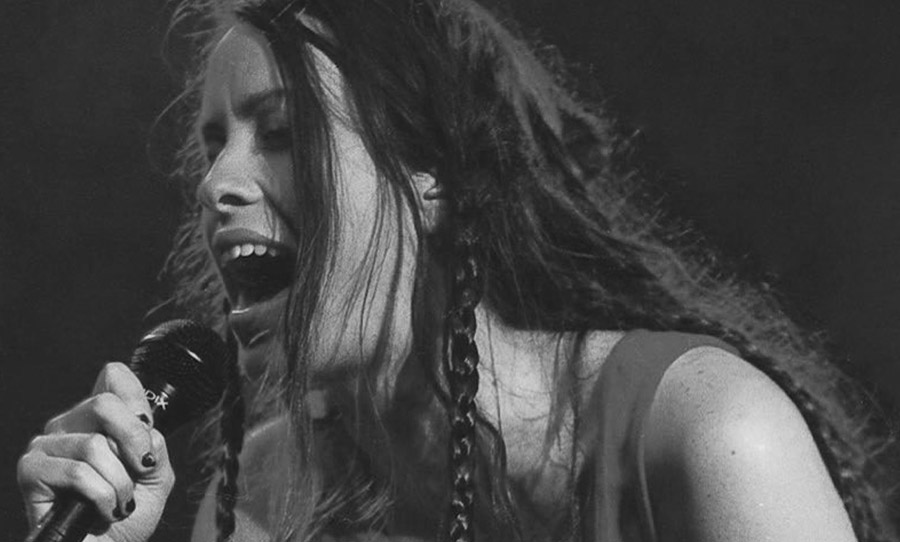Alanis Morissette’s Jagged Little Pill was a landmark of the ’90s for its creative pairing of pop with alt-rock guitars, raw vocals, and candid lyrics. Here’s why it mattered.
Jagged Little Pill was a watershed moment for Alanis Morissette, who moved away from the new jack swing of her earlier albums into a style that integrated elements of alternative rock, often wholly embracing those elements.
Jagged Little Pill came in part out of new creative freedoms that Morissette found after having parted ways with her former record label, but it also marked the end of her period as a child star.
As a result, the album finds Morissette dealing with darker themes like emotional deprivation, abuse of power dynamics in the music industry, forgiveness, and trauma.
Though the album is sometimes uncharitably characterised as a document of young adult angst, Morissette’s candour and humour are no doubt a huge part of what makes the album so enduring, even being immortalised in a musical that has continued to be performed since its premiere in 2018.
Finding new feet
When Alanis Morissette departed from her record label, she was just 19 years old. She had achieved success with her platinum-selling debut Alanis, though the follow up to that record Now is the Time had sold just half of the copies of her debut.
With that, her and the label parted ways, and though Morissette found herself a little lost, she had already been a child star who had now both literally and figuratively graduated from her adolescence. On the recommendation of her publisher, she linked up with producer Glen Ballard, who was immediately impressed by Morissette’s abilities as a songwriter and her headstrong personality.
Although Morissette had no guarantee of a record deal, Ballard agreed to work with her simply because the collaboration proved so fruitful. On the day the two first met, as Ballard told CBC, they immediately began working on a song (which doesn’t appear on the album) called No Avalon, with Morissette even helping rebuild the studio after it was damaged six weeks earlier in an earthquake.
Working quickly and effectively came to be the method for shaping the rest of the songs on Jagged Little Pill, which were frequently written and recorded within the same day. As Morissette explained:
“Our ritual was such that we would just get together, maybe at noon, we’d go to lunch, we’d have some conversation, some philosophical conversation about whatever the topic was that day, and then we would go into the studio and often the song would be about that topic.”
Working quickly was both the product of – and a contributing factor to – a self-confidence that informs Morissette’s lyrics and vocal performances. All of the vocal performances on Jagged Little Pill are from the first or second takes, Ballard told CBC, “Because she did not ever, ever get neurotic about vocals. A lot of singers just naturally will be. She just couldn’t be less concerned. She would just go out and sing”.
In Ballard, Alanis found someone who was willing to explore whatever idea she liked, and wasn’t concerned that she didn’t have a record deal.
“I think as we started writing more and more songs together, I just thought, ‘Oh, this is an invitation, this is complete freedom for me to be who I am yet at the same time feel safe’”, she told CBC.
Darker themes
Jagged Little Pill sees Morissette covering darker topics, partly a result of this newfound safety and freedom she received in Ballard. Many of the songs present an embittered but empowered Morissette who wryly recounts her experiences against past lovers and overtly sexist record executives.
In Right Through You, she sarcastically addresses a “Mr Man” who made her a “back-loaded puppet”:
“You took me for a joke/You took me for a child/You took a long hard look at my ass/And then played golf for a while”
“You took me out to wine, dine, 69 me/But didn’t hear a damn word I said”
Morissette approaches difficult topics with a humour and candour that empowers her in the face of the adversity the experiences cause her – it’s her way of “seeing right through” pain. As Ballard told CBC:
“People think that she was in this heavy state of mind when making it, the opposite was true. I’ve never been funnier, she laughed at everything I had to say.”
But the humour shouldn’t be confused for a lack of direction. Humour is just one tool in Jagged Little Pill’s kaleidoscopic vision. Opening track All I Really Want is rich with off-the-cuff references to Dickens and takes multiple perspectives. Perfect is Philip Larkin’s This Be The Verse for Gen X, and inhabits the voice of a parent. Throughout the album, quotes, observations, direct, and indirect speech all overlap in a cacophony that captures the experience of being at a crossroads in one’s life.
‘Raw’ is a glib descriptor to use for Morissette’s quick process and blunt songs, but it’s one she might reject, even commenting that she regretted the “malapropism” in Ironic – most of the vignettes are tragic or frustrating, not necessarily ironic, per se.
Rather than just raw, Morissette wanted Jagged Little Pill to be dense, even going to the length of putting a hidden track on the album in Your House. “We wanted to scare people,” she told CBC, and the song emerges from silence with lines about trespassing into an ex’s house while they’re gone.
Reception and legacy
Although Jagged Little Pill has been immortalised in a musical of the same name, many reviews of the show have led to some re-evaluation of the album – is it as politically engaged as the musical directors have made the show?
But Jagged Little Pill’s feminism is more about making the personal political. Morissette refuses at any point to apologise for the complexities of her feelings or the fact that her central opponent is really the lack of love shown to her by the world.
It would be easy to draw the album into tired debates about authenticity in pop and ‘alternative’ rock. Though the album was a commercial success that featured as many drum machines and samples as it did distorted guitars, it has to be remembered that in the landscape of the mid-90s, alternative rock was hardly an alternative.
I would suggest that Morissette’s blending of pop sheen with rawness did create something uniquely radical – a kind of hybrid sound that eventually found the hearts of many listeners, though taking a while to find a place in the industry.
In fact, most record companies the pair sent Jagged Little Pill to passed on the album until it found the passionate reception of Maverick’s Guy Oseary.
“The first song they played me was the demo of Perfect. Within, I don’t know, 20 or 30 seconds into the song, I was done. I was already blown away and never heard anything like it and wanted to sign her. That was really it, for me.”
When it was released, too, some critics responded with typically chauvinistic remarks, including that it was “too angry, too shrill, too lame, too loud, too immature, too fake”.
That Morissette’s radical frankness and invention both upset the establishment and conquered it makes it worth remembering – not that it needed any help in that department, being one of the most memorable albums of the ’90s.



